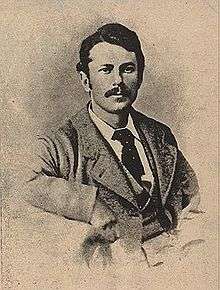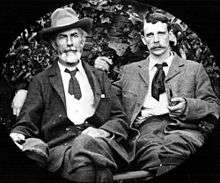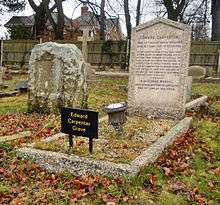Edward Carpenter
| Edward Carpenter | |
|---|---|
_-_Edward_Carpenter.jpg) | |
| Born |
Edward Carpenter 29 August 1844 Hove, Sussex, England |
| Died |
28 June 1929 (aged 84) England |
| Occupation | poet, anthologist, early gay activist and socialist philosopher |
Edward Carpenter (29 August 1844 – 28 June 1929) was an English socialist poet, philosopher, anthologist, and early activist for rights for homosexuals.[1]
A poet and writer, he was a close friend of Rabindranath Tagore, and a friend of Walt Whitman.[2] He corresponded with many famous figures such as Annie Besant, Isadora Duncan, Havelock Ellis, Roger Fry, Mahatma Gandhi, Keir Hardie, J. K. Kinney, Jack London, George Merrill, E. D. Morel, William Morris, Edward R. Pease, John Ruskin, and Olive Schreiner.[3]
As a philosopher he was particularly known for his publication of Civilisation, Its Cause and Cure in which he proposes that civilisation is a form of disease that human societies pass through.[4]
An early advocate of sexual freedoms, he had an influence on both D. H. Lawrence and Sri Aurobindo, and inspired E. M. Forster's novel Maurice.[5]
Early life
Born in Hove in Sussex, Carpenter was educated at nearby Brighton College where his father was a governor. His brothers Charles, George and Alfred also went to school there. When he was ten, he displayed a flair for the piano.[6]
His academic ability appeared relatively late in his youth, but was sufficient enough to earn him a place at Trinity Hall, Cambridge.[7] Whilst there he began to explore his feelings for men. One of the most notable examples of this is his close friendship with Edward Anthony Beck (later Master of Trinity Hall), which, according to Carpenter, had "a touch of romance".[6] Beck eventually ended their friendship, causing Carpenter great emotional heartache. Carpenter graduated as 10th Wrangler in 1868.[8] After university he joined the Church of England as a curate, "as a convention rather than out of deep Conviction".[9]
In 1871 he was invited to become tutor to the royal princes George Frederick (late King George V) and his elder brother, Prince Albert Victor, Duke of Clarence, but declined the position. The job instead went to his lifelong friend and fellow Cambridge student John Neale Dalton.[10] Carpenter continued to visit Dalton while he was tutor, and was presented with photographs of themselves by the princes.[11]
In the following years he experienced an increasing sense of dissatisfaction with his life in the church and university, and became weary of what he saw as the hypocrisy of Victorian society.[6] He found great solace in reading poetry, later remarking that his discovery of the work of Walt Whitman caused "a profound change" in him. (My Days and Dreams p. 64)
Moving to the North of England

Carpenter left the church in 1874 and became a lecturer in astronomy, sun worship, the lives of ancient Greek women and music, moving to Leeds as part of University Extension Movement, which was formed by academics who wished to introduce higher education to deprived areas of England. He hoped to lecture to the working classes, but found that his lectures were attended by middle class people, many of whom showed little active interest in the subjects he taught. Disillusioned,[6] he moved to Chesterfield, but finding that town dull, he based himself in nearby Sheffield a year later.[7] Here he finally came into contact with manual workers, and he began to write poetry. His sexual preferences were for working men: "the grimy and oil-besmeared figure of a stoker" or "the thick-thighed hot course-fleshed young bricklayer with a strap around his waist".[12]
In Sheffield, Carpenter became increasingly radical. Influenced by a disciple of Engels, Henry Hyndman, he joined the Social Democratic Federation (SDF) in 1883 and attempted to form a branch in the city. The group instead chose to remain independent, and became the Sheffield Socialist Society. While in the city he worked on a number of projects including highlighting the poor living conditions of industrial workers.
In May 1889, Carpenter wrote a piece in the Sheffield Independent calling Sheffield the laughingstock of the civilized world and said that the giant thick cloud of smog rising out of Sheffield was like the smoke arising from Judgment Day, and that it was the altar on which the lives of many thousands would be sacrificed. He said that 100,000 adults and children were struggling to find sunlight and air, enduring miserable lives, unable to breathe and dying of related illnesses.[13] In 1884, he left the SDF with William Morris to join the Socialist League.
When his father Charles Carpenter died in 1882, he left his son a considerable fortune. This enabled Carpenter to quit his lectureship to start a simpler life of market gardening in Millthorpe, near Barlow, Derbyshire.[14]
Life with George Merrill

On his return from India in 1891, he met George Merrill, a working class man also from Sheffield, 22 years his junior, and the two men struck up a relationship, eventually cohabiting in 1898.[7] Merrill had been raised in the slums of Sheffield and had no formal education. Their relationship endured and they remained partners for the rest of their lives, a fact made all the more extraordinary by the hysteria about homosexuality generated by the Oscar Wilde trial of 1895. Carpenter remarked in his work The Intermediate Sex:
Eros is a great leveller. Perhaps the true Democracy rests, more firmly than anywhere else, on a sentiment which easily passes the bounds of class and caste, and unites in the closest affection the most estranged ranks of society. It is noticeable how often Uranians of good position and breeding are drawn to rougher types, as of manual workers, and frequently very permanent alliances grow up in this way, which although not publicly acknowledged have a decided influence on social institutions, customs and political tendencies.[15]
Carpenter included among his friends the scholar, author, naturalist, and founder of the Humanitarian League, Henry S. Salt, and his wife, Catherine; the critic, essayist and sexologist, Havelock Ellis, and his wife, Edith; actor and producer Ben Iden Payne; Labour activists, John Bruce and Katharine Glasier; writer and scholar, John Addington Symonds and the writer and feminist, Olive Schreiner.[16] E. M. Forster was also close friends with the couple, who on a visit to Millthorpe in 1912 was inspired to write his gay-themed novel, Maurice.[17] Forster records in his diary that, Merrill, "...touched my backside - gently and just above the buttocks. I believe he touched most people's. The sensation was unusual and I still remember it, as I remember the position of a long vanished tooth. He made a profound impression on me and touched a creative spring."[7]
The relationship between Carpenter and Merrill was the template for the relationship between Maurice Hall and Alec Scudder, the gamekeeper in Forster's novel.[17] Carpenter was also a significant influence on the author D. H. Lawrence, whose Lady Chatterley's Lover can be seen as a heterosexualised Maurice.[18]
Later political activism
.jpg)
In 1902 his anthology of verse and prose, Ioläus: An Anthology of Friendship, was published.[19]
In 1915, he published The Healing of Nations and the Hidden Sources of Their Strife, where he argued that the source of war and discontent in western society was class-monopoly and social inequality.
Merrill's death and Carpenter's last years
After the First World War he had moved to Guildford, Surrey, with George Merrill.[20] In January 1928, Merrill died suddenly.[7]
In May 1928, Carpenter suffered a paralytic stroke. He lived another 13 months before he died on Friday 28 June 1929, aged 84.[7] He was interred, in the same grave as Merrill, at the Mount Cemetery at Guildford in Surrey.
Influence

Ansel Adams was an admirer of Carpenter's writings, especially Towards Democracy.[21] Leslie Paul was influenced by Carpenter's ideas; in turn he passed on Carpenter's ideas to the scouting group he founded, The Woodcraft Folk.[22]
Carpenter has also been known as the "Saint in Sandals", the "Noble Savage" and, more recently, the "gay godfather of the British left".[23]
Works
| The Religious Influence of Art | 1870 |
| Narcissus and other Poems | 1873 |
| Moses: A Drama in Five Acts | 1875 |
| Towards Democracy | 1883 |
| Modern Money Lending | 1885 |
| England's Ideal | 1887 |
| Chants of Labour | 1888 |
| Civilisation: Its Cause and Cure | 1889 |
| From Adam's Peak to Elephanta: Sketches in Ceylon and India | 1892 |
| A Visit to Ghani: From Adam's Peak to Elephanta | 1892 |
| Homogenic Love and Its Place in a Free Society | 1894 |
| Sex Love and Its Place in a Free Society | 1894 |
| Marriage in Free Society | 1894 |
| Love's Coming of Age | 1896 |
| Angels' Wings: A Series of Essays on Art and its Relation to Life | 1898 |
| The Art of Creation | 1904 |
| Prisons, Police, and Punishment | 1905 |
| Days with Walt Whitman: With Some Notes on His Life and Work | 1906 |
| Iolaus: Anthology of Friendship | 1902 |
| Sketches from Life in Town and Country | 1908 |
| Non-governmental society | 1911 |
| The Intermediate Sex: A Study of Some Transitional Types of Men and Women | 1912 |
| The Drama of Love and Death: A Study of Human Evolution and Transfiguration | 1912 |
| George Merrill, A True History | 1913 |
| Intermediate Types Among Primitive Folk: A Study in Social Evolution | 1914 |
| The Healing of Nations | 1915 |
| My Days and Dreams, Being Autobiographical Notes | 1916 |
| Never Again! | 1916 |
| Towards Industrial Freedom | 1917 |
| Pagan and Christian creeds | 1920 |
| Civilisation, Its Cause and Cure, and Other Essays | 1921 |
| Towards Democracy | 1922 |
| The story of Eros and Psyche | 1923 |
| Some Friends of Walt Whitman: A Study in Sex-Psychology | 1924 |
| The Psychology of the Poet Shelley | 1925 |
Notes
- ↑ Warren Allen Smith: Who's Who in Hell, A Handbook and International Directory for Humanists, Freethinkers, Naturalists, Rationalists, and Non-Theists, Barricade Books, New York, 2000, p. 186; ISBN 978-1-56980-158-1.
- ↑ "Excerpt from Gay Roots Vol. 1: THE GAY SUCCESSION The following document first appeared in Gay Sunshine Journal 35 (1978) and was reprinted as an appendix to the Allen Ginsberg interview in the book Gay Sunshine Interviews, Volume 1, Gay Sunshine Press, 1978." http://www.leylandpublications.com/exc_gaysuccess.html, retrieved 09/16/2014
- ↑ FABIAN ECONOMIC AND SOCIAL THOUGHT Series One: The Papers of Edward Carpenter, 1844-1929, from Sheffield Archives Part 1: Correspondence and Manuscripts at www.adam-matthew-publications.co.uk
- ↑ Carpenter, Edward. Civilisation, Its Cause and Cure.
- ↑ Andrew Harvey, ed. (1997). The Essential Gay Mystics.
- 1 2 3 4 "Edward Carpenter, My Days and Dreams, London: Unwin, 1916.".
- 1 2 3 4 5 6 Rowbotham 2009
- ↑ "Carpenter, Edward (CRPR864E)". A Cambridge Alumni Database. University of Cambridge.
- ↑ Philip Taylor's Biography of Carpenter, Philip Taylor 1988
- ↑ Aronson p.48
- ↑ Aronson p.50
- ↑ Aronson p.49 citing d'Arch Smith, Love in Earnest p. 192
- ↑ Edward Carpenter, Letter, Sheffield Independent (25 May 1889)
- ↑ http://www.visitchesterfield.info/thedms.asp?dms=13&venue=6050330
- ↑ Edward Carpenter The Intermediate Sex, p.114-115
- ↑ Gray, Stephen. 2013. Two Dissident Dream-Walkers: The Hardly Explored Reformist Alliance between Olive Schreiner and Edward Carpenter. English Academy Review: Southern African Journal of English Studies Volume 30, Issue 2, 2013.
- 1 2 Rowse, A. L. (1977). Homosexuals in History: A Study of Ambivalence in Society, Literature, and the Arts. New York, New York: Macmillan. pp. 282–283. ISBN 0-88029-011-0.
- ↑
- ↑ The 1917 New York edition is now available as a free online e-book
- ↑ Brighton Ourstory Project - Lesbian and Gay History Group at www.brightonourstory.co.uk
- ↑ Ansel Adams and the American Landscape: A Biography by Jonathan Spaulding, University of California Press, 1998.
- ↑ Derek Wall, Green History : A Reader in Environmental Literature, Philosophy and Politics,London, Routledge, 1993. ISBN 041507925X (pp. 232-34)
- ↑ "Review: Edward Carpenter by Eliot Smith - Books - The Guardian". the Guardian.
References
- Aronson, Theo (1994). Prince Eddy and the Homosexual Underworld. London: John Murray. ISBN 0-7195-5278 8.
- Beith, Gilbert (ed), Edward Carpenter: In Appreciation, George Allen & Unwin, 1931.
- Greig, Noël: Dear Love of Comrades: London: Gay Men's Press, 1979.
- Lewis, Edward, Edward Carpenter: An Exposition and an Appreciation, Macmillan, 1915.
- Rowbotham, Sheila (2009). Edward Carpenter: A Life of Liberty and Love. London: Verso. ISBN 9781844674213.
- Toibin, Colm. "Urning". London Review of Books. LRB (29 January 2009).
- Tsuzuki, Chushchi, Edward Carpenter 1844-1929 Prophet of Human Fellowship, Cambridge: Cambridge University Press, 1980.
- Twigg, Julia The Vegetarian Movement in England 1847-1981, PhD (LSE) thesis, 1981, in particular Chapter Six e, i, as on the International Vegetarian Union website.
Further reading
- Edward Carpenter and Tony Brown (1990), Edward Carpenter and Late Victorian Radicalism, Routledge, ISBN 978-0-71463-400-5
- Stanley Pierson, "Edward Carpenter, Prophet of a Socialist Millennium," Victorian Studies, vol. 13, no. 3 (March 1970), pp. 301–318.
- Sheila Rowbotham, "In Search of Edward Carpenter," Radical America, vol. 14, no. 4 (July-Aug. 1980), pp. 48–59.
External links
| Wikisource has original works written by or about: Edward Carpenter |
| Wikiquote has quotations related to: Edward Carpenter |
- edwardcarpenter.net - A web-based archive of works by Edward Carpenter
- Works by Edward Carpenter at Project Gutenberg
- Works by or about Edward Carpenter at Internet Archive
- Works by Edward Carpenter at LibriVox (public domain audiobooks)

- Information about the Edward Carpenter Collection at Sheffield Archives